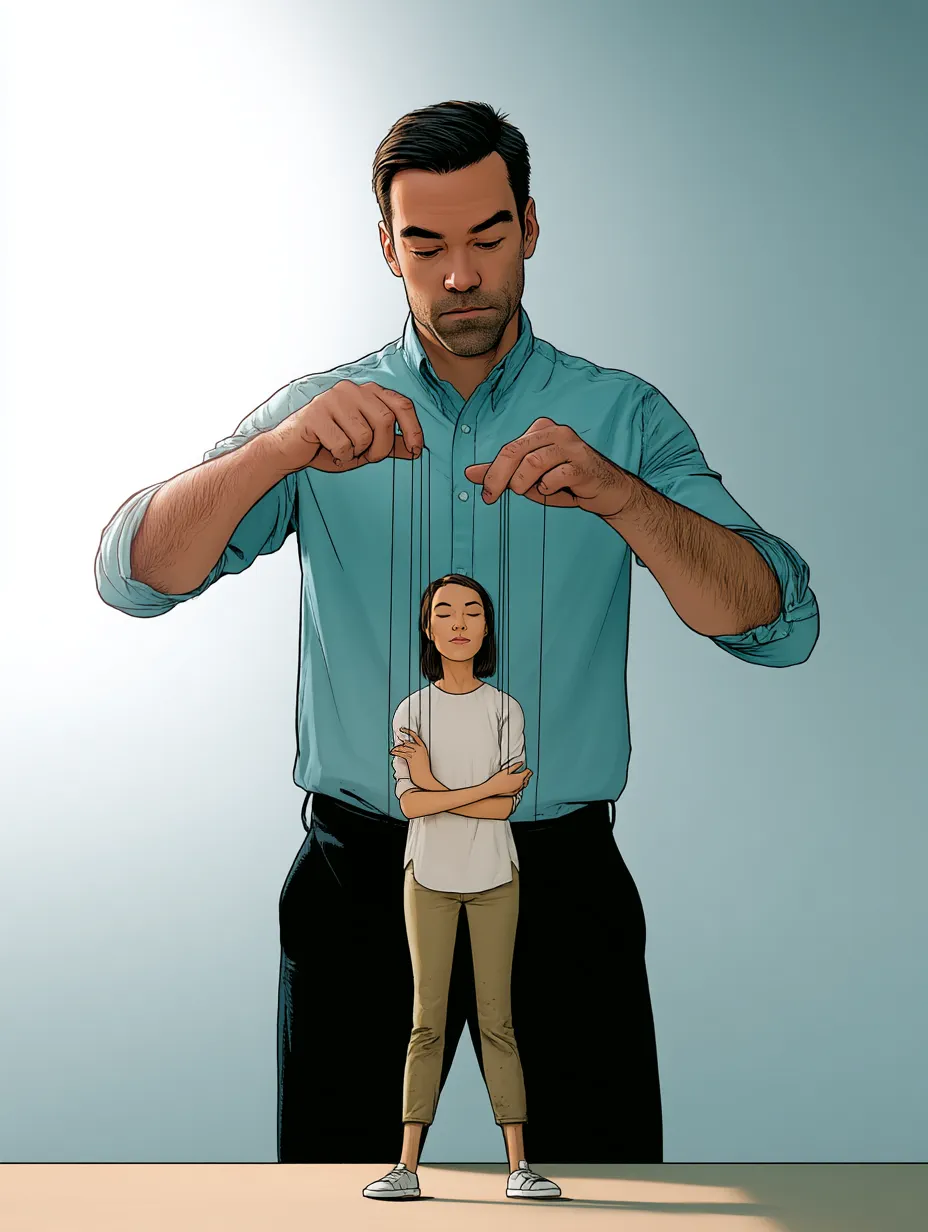Dating a Narcissist: 10 Signs & How to Protect Yourself
What to expect in this article:
Is It Love, Or Is It Something Else? Navigating the Maze of Dating a Narcissist
Hey everyone, Oscar here.
Starting a new relationship can feel amazing, right? There’s that spark, the excitement, the hope. You meet someone, and things click. It feels wonderful. However, sometimes, deep down, there’s a little whisper. A feeling that something isn’t quite right, even if you can’t put your finger on it. It can be confusing when someone seems so into you, yet leaves you feeling a bit… off.
It’s tough because we want to believe the best. We want that fairy tale. But sometimes, the person we’re dating isn’t showing their true self. Today, I want to talk gently about something tricky: dating a narcissist. Now, that word gets thrown around a lot. Really, it describes someone who is deeply self-focused. They often lack the ability to truly see or value others’ feelings.
My goal here isn’t to label everyone. Instead, it’s to share some common signs I’ve learned about, both from my own experiences and from others. Hopefully, this can help you trust your own gut feelings. Recognizing these patterns early can help protect your heart. Let’s walk through this together.
1. The Dizzying Start: What Love Bombing Feels Like
Have you ever met someone and felt completely swept off your feet? Almost instantly? Maybe they told you things like, “You’re everything I’ve ever looked for,” or “I’ve never felt this way before,” really early on. They might shower you with compliments, gifts, constant texts, and grand plans for the future. It feels incredibly flattering. Like you’ve finally found “the one.”
This intense rush is often called “love bombing.” Honestly, it feels amazing at the time. But sometimes, it’s a tactic used by someone with narcissistic traits. It’s less about genuine deep connection and more about making you feel indebted and hooked quickly. For example, they might push for commitment super fast, talking about moving in or marriage within weeks. While exciting, this intensity can be a way to gain control before you see behind the mask.
It’s less about genuine deep connection and more about making you feel indebted and hooked quickly.

Takeaway:
Watch out for overwhelming affection and fast commitment early on (“love bombing”). It can feel amazing but is often a tactic to hook you quickly, not genuine deep love.
2. Beyond the Charm: Early Red Flags You Might Miss
People with narcissistic traits can be incredibly charming at first. They might be the life of the party, witty, and seem really confident. Indeed, this charm is often what draws us in. But if you look closely, some little red flags might pop up when dating a narcissist.
Do they talk about themselves constantly? Perhaps every story circles back to their achievements, their problems, their experiences. They might subtly exaggerate their successes. Notice how they react when the spotlight isn’t on them. Also, watch how they treat people they consider “unimportant,” like a waiter or a cashier. A sense of entitlement often shows here. They might expect special treatment everywhere they go.
Watch how they treat people they consider “unimportant,” like a waiter or a cashier.
Takeaway:
Look past the initial charm. Notice if they constantly talk about themselves, need excessive praise, act entitled, or treat others poorly – these are early warnings when dating a narcissist.
3. “Did They Really Say That?” Subtle Put-Downs and Boundary Pushes
This one can be really confusing. It’s not always obvious insults. Sometimes, it’s more subtle. Maybe they give you backhanded compliments, like “You look surprisingly good in that outfit,” leaving you feeling unsure if it was nice or not. Or they might offer “helpful” criticism that feels more like a jab at your choices or abilities. They might tease you about something you’re sensitive about, then say, “I was just joking! You’re too sensitive.“
Additionally, pay attention to boundaries. Do they get annoyed if you don’t text back immediately? Do they pressure you into sharing things you’re not ready to share? Or maybe push for physical intimacy before you feel comfortable? These little boundary pushes early on can be a sign they don’t respect your personal space or limits. It chips away at your confidence slowly.
Takeaway:
Pay attention to small digs disguised as jokes or “help,” and notice if they push your boundaries. These subtle actions chip away at your confidence and respect.
4. The Conversation Mirror: It Always Reflects Them

Think about your conversations. When you’re dating a narcissist, you might notice the dialogue feels… unbalanced. You share something important, something you’re excited or worried about. Then, somehow, the topic shifts right back to them. They might give a quick nod, then launch into their own story. Or they might seem bored or dismissive when you talk about your day.
For instance, you might be telling them about a problem at work. Instead of listening, they interrupt with, “Yeah, that reminds me of this huge challenge I overcame last year…” It leaves you feeling unheard. Like your feelings and experiences don’t really matter. This lack of genuine empathy is a core trait. You end up feeling more like an audience than a partner.
Takeaway:
Feeling unheard? If conversations always steer back to them and your feelings get dismissed, it’s a strong sign of their lack of empathy.
5. When Criticism Hits a Nerve: That Fragile Ego
Here’s something that can seem contradictory. They might act super confident, even arrogant. Yet, they can be incredibly sensitive to criticism. Even gentle feedback or a perceived slight can trigger a surprisingly strong reaction. Maybe you suggest a different way to do something, and they snap defensively. Or you disagree with their opinion, and they launch into an argument, blaming you for “attacking” them.
This defensiveness is often called “narcissistic injury.” It might seem like anger, but underneath it’s often deep insecurity. They need constant admiration to prop up a fragile sense of self. Therefore, anything that challenges their perfect self-image feels like a major threat. This can make you feel like you have to walk on eggshells around them.
Takeaway:
Their strong negative reaction to even gentle criticism often hides deep insecurity. Feeling like you have to “walk on eggshells” is a red flag.
6. The Quiet Manipulators: Spotting Covert Narcissism in Dating
Not all narcissism is loud and flashy. Some people with these traits are more “covert” or hidden. They might seem shy, sensitive, or even like a victim. Instead of boasting, they might use different tactics to manipulate. For example, they might use guilt trips masterfully. “I did all this for you, and you can’t even do this one small thing for me?“
They might use passive aggression – think sarcastic comments or the silent treatment. They often play the victim, making you feel sorry for them and responsible for their happiness. Dating a covert narcissist can be especially confusing. You might leave conversations feeling drained, guilty, or unsure what just happened, even though they seemed quiet or vulnerable.

Takeaway:
Narcissism isn’t always loud. Be aware of quieter manipulation like guilt trips, playing the victim, or passive aggression that leaves you feeling drained or confused.
7. The Whirlwind Cycle: From Fairy Tale to Heartbreak
Relationships with narcissists often follow a predictable, painful cycle. Understanding it can help you see the pattern:
- Idealization: This is the start, the love bombing phase. They put you on a pedestal. You feel adored. Everything seems perfect.
- Devaluation: Slowly (or sometimes suddenly), things shift. The compliments turn into criticism. The adoration fades. They might become distant, dismissive, or easily annoyed. They start finding fault with things they used to praise.
- Discard: Often, when they feel you’re no longer useful, or if you challenge them too much, they might end the relationship abruptly. Sometimes with shocking coldness, leaving you completely bewildered.
Sometimes, after a discard, they might try to pull you back in. This is called “hoovering.” They might reappear with apologies, promises to change, or renewed love bombing. However, this is often just a way to restart the cycle. Recognizing this pattern when dating a narcissist is crucial.
They might reappear with apologies, promises to change, or renewed love bombing.
Takeaway:
Recognize the common pattern: Intense idealization (love bombing), followed by devaluation (criticism/distance), and often an abrupt discard. Knowing this cycle helps you understand the dynamic when dating a narcissist.
8. Why It Hurts So Much: The Emotional Toll
If you’ve been dating a narcissist, the emotional impact can be huge. It’s not just a normal breakup sadness. You might feel deep confusion, constantly second-guessing yourself. Anxiety levels can go through the roof. You might even experience symptoms of depression.
Gaslighting is a common tactic. They might deny saying things you clearly remember them saying. Or they tell you you’re “crazy” or “too emotional” for reacting to their behavior. This can make you doubt your own sanity and perception of reality. Over time, you might lose your sense of self, feel emotionally exhausted, and find it hard to trust anyone – including yourself. Please know, these feelings are a normal response to an abnormal situation. It’s not your fault.
Takeaway:
Feeling confused, anxious, or doubting yourself is a normal reaction to narcissistic behavior like gaslighting. The emotional pain is real, and it’s not your fault.
9. Trusting Your Gut: That Feeling That Something Isn’t Right

Through all the confusion, there’s one guide that rarely steers us wrong: our intuition. That little feeling in your stomach. That sense of unease, even when things look okay on the surface. Maybe you feel tense around them, even if you can’t explain why. Or you find yourself constantly trying to justify their behavior to yourself or others.
Listen to that feeling. It’s your inner wisdom trying to protect you. Often, our bodies react to emotional danger before our minds fully grasp it. If something consistently feels off when dating someone, even if they seem perfect on paper, pay attention. Your feelings are valid. They are important signals.
Often, our bodies react to emotional danger before our minds fully grasp it.
Takeaway:
Your intuition is a powerful guide. Listen to that nagging feeling of unease – it’s often your inner wisdom signaling that something is wrong.
10. Finding Your Footing Again: Steps Towards Healing
Realizing you might be dating a narcissist can feel overwhelming. But recognizing it is the first, brave step towards protecting yourself and healing. It’s okay to feel hurt, angry, or confused. Be gentle with yourself.
Here are a few steps that might help:
- Acknowledge Reality: Gently accept what you’re seeing, without harsh judgment on yourself or them initially. Just see the patterns.
- Seek Support: Talk to trusted friends or family who listen without judgment. Sometimes, professional help from a therapist who understands narcissistic dynamics is incredibly valuable. You don’t have to go through this alone.
- Learn About Boundaries: Start practicing saying “no” to things that don’t feel right. Protect your time, energy, and emotional space. Healthy boundaries are crucial.
- Reconnect with Yourself: What did you enjoy before this relationship? Revisit old hobbies, spend time with supportive people, focus on activities that make you feel good about yourself.
- Educate Yourself: Learning more about narcissistic traits can be empowering. Understanding the dynamics helps demystify the experience. Consider reading more from reputable sources like the Mayo Clinic’s overview of NPD or resources on emotional abuse recovery and maybe explore our other posts, like Understanding Gaslighting.
Takeaway:
Healing starts with acknowledging the situation gently. Seek support, learn to set boundaries, reconnect with yourself, and educate yourself about these dynamics.
Taking Gentle Steps Forward
Navigating the world of dating can be tough, especially when you encounter someone with narcissistic traits. Recognizing the signs we talked about – the intense start, the self-focus, the subtle digs, the lack of empathy – isn’t about blaming. It’s about awareness. It’s about protecting your own peace and well-being.
Healing takes time, and it’s okay to take small steps. Remember, you deserve a relationship where you feel seen, heard, respected, and valued for who you are. You deserve kindness and genuine empathy.
If any of this resonated with you, please know you’re not alone. Many of us have walked similar paths. Feel free to share this article if you feel comfortable. Sometimes, just knowing others understand makes a world of difference.
Warmly,
Oscar







